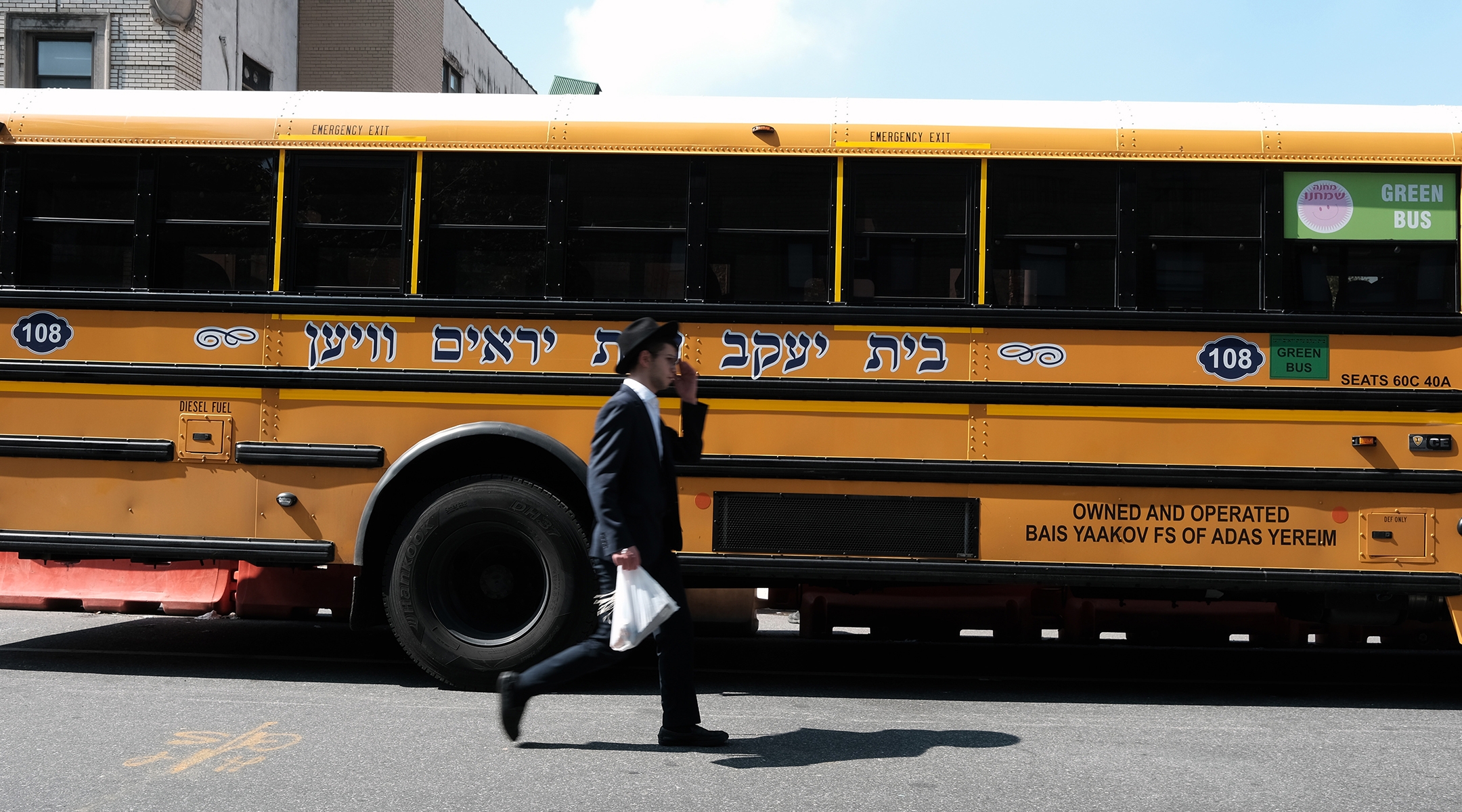New York State adopts ban on corporal punishment proposed in wake of yeshiva probe
Hasidic leaders denied the New York Times’ findings that the practice was widespread in their schools

A yeshiva school bus drives through Borough Park, Brooklyn. Photo by Spencer Platt/Getty Images
(New York Jewish Week) – A ban on corporal punishment in private schools, proposed in the wake of an extensive New York Times investigation alleging that the practice is prevalent in Hasidic yeshivas, is now law in the State of New York.
New York Gov. Kathy Hochul signed the law on Wednesday after it was unanimously approved by the state legislature, making New York one of just four states — the others being New Jersey, Iowa and Maryland — where the practice is banned in private schools. Corporal punishment has been banned at New York’s public schools since 1985.
“Corporal punishment is unacceptable,” Hochul said in a statement. “This new law will ensure students in every New York school are protected from mistreatment.”
Allegations of corporal punishment were included in the Times series, published last September, that also delved into public funding for private Jewish schools that fell short in teaching secular studies.
“The attitude was constantly that you could get hit,” Ari Hershkowitz, an alumnus of United Talmudical Academy in Williamsburg told the New York Times at the time. “We were constantly under threat of that.”
Richard Bamberger, a spokesman for some Hasidic yeshivas, told the New York Times this week that leaders of the schools had no issue with the new law.
“What they do oppose is the inaccurate suggestion that the legislation arose because of an abuse problem in yeshivas, which the Senate sponsor publicly stated is false,” he said.
Bamberger was referring to State Senator Julia Salazar, a Democrat whose district includes Hasidic neighborhoods in Brooklyn. She introduced the bill the day after the Times published its article, although she later tweeted that she did not have any evidence of a pattern of corporal punishment in yeshivas.
Hasidic leaders and their allies have pushed back on the notion that corporal punishment is common at yeshivas.
“As a yeshiva parent/former student, I’m not familiar with the use of corporal punishment at yeshivas, nor would I tolerate it,” Simcha Eichenstein, a New York State Assembly member representing Borough Park, posted on X in March, when the legislation was proposed.
Charles Lavine, a Jewish Democrat who represents parts of Nassau County in Long Island, sponsored the bill in the Assembly. It defines corporal punishment as “the use of physical force to cause pain or harm to someone accused of breaking a law or rule” and includes “spanking or slapping, hitting with weapons such as paddles, rulers, or belts, and forcing students to perform physically painful activities such as crawling over rough terrain or excessive running.”
“Physical punishment in educational settings is abhorrent and I am pleased that New York is protecting our children by outlawing its use. Students must learn in a safe environment. The message to any abusive adults is very simple, keep your hands off our kids,” Lavine said in a statement.
Yaffed, a Jewish nonprofit that has urged government scrutiny of secular education at Hasidic yeshivas, welcomed the legislation in a post on X, formerly Twitter.
This article originally appeared on JTA.org.
A message from our Publisher & CEO Rachel Fishman Feddersen

I hope you appreciated this article. Before you go, I’d like to ask you to please support the Forward’s award-winning, nonprofit journalism so that we can be prepared for whatever news 2025 brings.
At a time when other newsrooms are closing or cutting back, the Forward has removed its paywall and invested additional resources to report on the ground from Israel and around the U.S. on the impact of the war, rising antisemitism and polarized discourse.
Readers like you make it all possible. Support our work by becoming a Forward Member and connect with our journalism and your community.
— Rachel Fishman Feddersen, Publisher and CEO


























